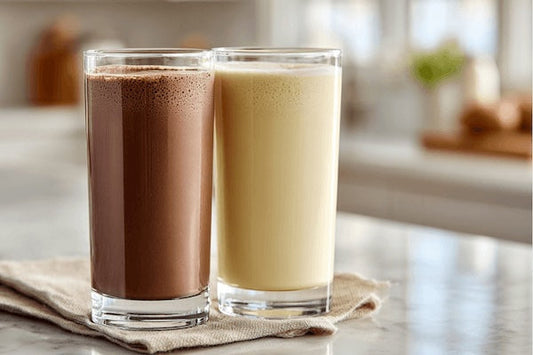Menopause is a natural phase in a woman’s life, marking the end of menstruation and reproductive capability. While it’s not a medical condition in itself, the transition—typically occurring between ages 45 and 55—can come with a variety of uncomfortable symptoms, such as hot flashes, night sweats, fatigue, weight gain, mood swings, sleep disturbances, joint pain, and brain fog.
Understandably, many women turn to supplements to help manage these symptoms and support their overall health. With shelves stacked with options—from powders to pills to shakes—it can be overwhelming to know what actually works and what your body truly needs during this life stage.
This article breaks down the most effective and commonly recommended menopause supplements, their benefits, and how different supplement formats compare in terms of convenience, absorption, and impact
Common Menopause Symptoms
Before we dive into supplements, it's helpful to understand what women are trying to manage during menopause. The most common symptoms include:
- Hot flashes and night sweats
- Sleep disturbances
- Mood swings or increased anxiety
- Brain fog or forgetfulness
- Weight gain, especially around the midsection
- Loss of muscle mass and strength
- Reduced bone density (osteopenia or osteoporosis)
- Bloating and digestive issues
These changes are largely driven by hormonal shifts, particularly declining levels of oestrogen and progesterone. Nutritional support can help bridge the gaps and provide relief from these symptoms while supporting long-term health.

Key Menopause Supplements to Consider
Let's look at the main supplements you should be considering based on the changes your body will be experiencing when oestrogen levels decline.
Protein: The Foundation for Strength and Metabolism
Protein is often overlooked in menopause discussions, but it plays a critical role. As oestrogen declines, women naturally lose lean muscle mass, which can slow metabolism and contribute to weight gain.
Why it's important:
- Supports muscle maintenance and growth
- Helps regulate appetite and reduce cravings
- Aids in blood sugar balance, which is key to managing energy and mood
Best sources:
- Whey protein powder (quickly absorbed, ideal post-workout)
- Plant-based proteins (pea, hemp, soy – for dairy-free needs)
- High-protein shakes or bars for convenience
Pro tip: Look for a protein powder that contains at least 20–25g of protein per serving and is low in sugar. Collagen peptides can also be a great addition to support joint and skin health.
Ashwagandha KSM-66: Stress and Sleep Support
Ashwagandha is an adaptogenic herb, and the KSM-66 form is a highly concentrated, full-spectrum extract. This is particularly helpful during menopause when cortisol (the stress hormone) tends to increase and sleep becomes elusive.
Benefits:
- Reduces cortisol levels, calming the nervous system
- Helps manage anxiety, mood swings, and irritability
- Supports deep, restorative sleep
- May improve thyroid function and energy levels
Format options:
- Capsules (convenient, pre-dosed)
- Powders (can be mixed into smoothies or warm drinks)
- Tinctures (liquid drops – faster absorption, but taste varies)
Note: KSM-66 is the most clinically studied form of Ashwagandha with proven benefits. It works best when taken consistently over several weeks.
Vitamin D, Magnesium, Calcium & Vitamin K: The Bone Health Quartet
Oestrogen helps protect bones, and its decline can lead to a rapid reduction in bone density—making postmenopausal women more susceptible to osteoporosis and fractures.
Vitamin D3
- Improves calcium absorption
- Boosts immune function
- Supports mood and energy levels
Magnesium
- Works alongside Vitamin D and calcium to strengthen bones
- Reduces muscle cramps and improves sleep quality
- Helps regulate blood pressure and nerve function
Calcium
- Essential for bone density
- Also plays a role in heart and muscle function
Vitamin K2
- Directs calcium into the bones (and away from arteries, preventing calcification)
Tip: Look for a supplement that combines Vitamin D3 + K2 for maximum bone benefits, ideally alongside magnesium and calcium in the correct ratios.
Fibre: Gut Health, Hormone Balance, and Debloating
The gut microbiome plays a surprisingly large role in hormone balance, weight management, and bloating—all of which are common concerns during menopause.
Why fibre matters:
- Helps eliminate excess oestrogen via the digestive tract
- Supports the growth of beneficial gut bacteria
- Reduces bloating and constipation
- Aids in blood sugar control and appetite regulation
Sources of Fibre:
- Psyllium husk (gentle bulk-forming fibre)
- Inulin or chicory root (prebiotic fibres that nourish gut flora)
- Flaxseed and chia seeds (also high in omega-3s)
- Fibre-rich shakes or drink mixes (easy to add to a daily routine)
Tip: Aim for 25–30g of fibre daily. Introduce gradually to avoid gas and bloating.
Supplement Formats: Pills, Powders, and Shakes – Pros and Cons
Pills & Capsules Pros:
- Convenient, portable
- Pre-measured doses
- Longer shelf life
Pills & Capsules Cons:
- Hard to swallow for some
- May include fillers or binders
- Slower absorption for some nutrients
Best for: Ashwagandha, Vitamin D/K, Magnesium, Multivitamins
Powders Pros:
- Easy to mix into drinks, smoothies, or foods
- Often higher potency per serving
- Faster absorption
Powders Cons:
- Require preparation
- Can be messy or clump if not blended well
- Taste can be off-putting for some
Best for: Protein, Fibre, Magnesium citrate (powder form is gentler on digestion), Ashwagandha
Meal Replacement Shakes Pros:
- Can help to manage menopause weight gain
- Replaces an expense you already have ( lunch, breakfast or dinner)
- Can combine multiple supplements (protein + fibre + adaptogens)
- Taste is usually more palatable
- Guide To Shake Diet For Women 40+
Meal Replacement Shakes Cons
- Can be high in sugar or artificial ingredients
- More expensive than other formats
- May not be as customizable in dosage
- Needs to be pre-prepped
Best for: Protein, Fibre, Comprehensive wellness blends.
How to Choose the Best Menopause Supplement Stack
When building your supplement routine, aim for a core combination that supports multiple areas. Here’s a simplified stack:
Morning Supplement Suggestions
- Protein shake (with added fibre or greens)
- Vitamin D3 + K2
- Magnesium (if energy-boosting, like magnesium threonate)
Afternoon Supplement Suggestions
- Ashwagandha KSM-66 (capsule or powder)
- Optional: additional calcium/magnesium blend
Evening Supplement Suggestions
- Magnesium glycinate or citrate (for sleep and relaxation)
- Herbal teas or collagen peptides for skin and joint support

A Final Note: Lifestyle Still Matters
While supplements can offer targeted relief and nutritional support, they work best when combined with healthy lifestyle habits:
- Strength training to maintain muscle and bone mass
- A fibre-rich diet full of vegetables, legumes, and whole grains
- Quality sleep hygiene and stress reduction practices
- Regular movement to support mood and metabolism
Menopause doesn’t have to mean decline. With the right nutritional support, it can be a powerful time of strength, resilience, and renewal.
Conclusion
Menopause supplements can be powerful allies in navigating the physical and emotional changes of midlife. The best menopause supplement strategy addresses multiple needs—muscle preservation, bone health, hormonal balance, and gut wellness.
Key nutrients like protein, Ashwagandha KSM-66, Vitamin D, magnesium, calcium, Vitamin K2, and fibre can make a significant difference in how you feel, sleep, and function.
Choosing the right format—whether powders, pills, or shakes—comes down to your lifestyle, preferences, and how well your body absorbs them.
As always, consult a healthcare provider before starting any new supplement routine, especially if you're on medication or have pre-existing conditions.
Frequently Asked Questions (FAQs)
What are the best supplements for menopause weight gain?
The most effective supplements for menopause-related weight gain are high-quality protein powders, fibre supplements, and ashwagandha. Protein helps preserve muscle mass and boosts metabolism, while fibre supports gut health and appetite regulation. Ashwagandha reduces cortisol, which is linked to abdominal fat storage.
How does Ashwagandha help during menopause?
Ashwagandha, especially the clinically studied KSM-66 form, acts as an adaptogen to reduce cortisol (the stress hormone). This can improve sleep, ease anxiety, reduce fatigue, and support hormone balance—making it a valuable tool for managing menopause symptoms.
Do I need calcium and vitamin D during menopause?
Yes. Declining estrogen increases the risk of osteopenia and osteoporosis. Calcium, along with vitamin D3, magnesium, and vitamin K2, helps maintain strong bones and prevent fractures. A combined supplement or bone health blend is often most effective.
Are meal replacement shakes or pills better for menopause supplements?
It depends on your preferences and goals. Meal replacement shakes are ideal for combining nutrients (like protein + fibre + adaptogens+vitamins and minerals) in one drink. They can also help to manage weight gain which is very common in perimenopause. Pills are convenient and portable, but have slower absorption. Powders offer high doses but require mixing with shakes or other ingredients and taste adjustment.
Can supplements really help with menopause bloating and gut issues?
Yes. Fibre supplements, especially prebiotics like FOS, inulin or psyllium husk, support gut health and regular digestion. A healthy gut microbiome helps eliminate excess oestrogen, reducing bloating and rebalancing hormones. Pair with hydration and a fibre-rich diet for best results.







